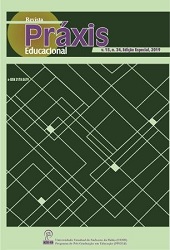FORMAÇÃO CONTINUADA DOCENTE: AVANÇOS E DILEMAS NA VISÃO DOS COORDENADORES PEDAGÓGICOS
DOI:
https://doi.org/10.22481/praxisedu.v15i34.5459Palabras clave:
continuing education, teachers, pedagogical coordinators, teacher knowledgeResumen
The purpose of this text is to bring some considerations about the advances and dilemmas in the continuing teacher education of the municipal public schools of Rio de Janeiro City. Pedagogical coordinator stimulates in-service teacher education. Therefore, this article is based on two qualitative researches carried out with pedagogical coordinators (OLIVEIRA 2009; 2015) which reported the paths of continuing education performed with teachers. Considering the challenges faced by the pedagogical coordinators and the strategies they use to promote continuing teacher education, we bring the following questions: How is the process of teacher in-service education developed in the molds of current educational policies? What is the role of the pedagogical coordinator in teacher education? What are the dilemmas faced by coordinators in everyday school? Freire (2002) advocates constant reflection on the practice and, together with the student, seeking the construction of knowledge; Tardif (2014) affirms that "social knowledge" is constructed in the teaching group. Data revealed that coordinators seek different strategies to promote continuing teacher education: dynamics, "experience exchange", texts reading, collective reflections. However, they revealed that teacher shortages and absenteeism are common factors in school and that they make it difficult not only for teachers to attend collective meetings but also for the coordinator to be present at the meetings of continuing teacher education. We consider that the disinvestment of the State and the predominance of performative indicators in the policies of the Secretaria Municipal de Educação (SME) are identified as responsible for the fragility of continuing teacher education in school.
Descargas
Descargas
Publicado
Número
Sección
Licencia
Você é livre para:
Compartilhar - copia e redistribui o material em qualquer meio ou formato; Adapte - remixe, transforme e construa a partir do material para qualquer propósito, mesmo comercialmente. Esta licença é aceitável para Obras Culturais Livres. O licenciante não pode revogar essas liberdades, desde que você siga os termos da licença.
Sob os seguintes termos:
Atribuição - você deve dar o crédito apropriado, fornecer um link para a licença e indicar se alguma alteração foi feita. Você pode fazer isso de qualquer maneira razoável, mas não de uma forma que sugira que você ou seu uso seja aprovado pelo licenciante.
Não há restrições adicionais - Você não pode aplicar termos legais ou medidas tecnológicas que restrinjam legalmente outros para fazer qualquer uso permitido pela licença.












